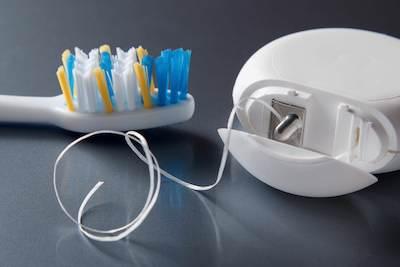
Healthy gums are essential for a healthy, long-lasting smile. However, many people forget about their gums or don’t understand just how important it is to take care of them. Our gums seal around our teeth and provide a protective layer against bacteria and disease. Also, our gum tissue is the supportive structure that keeps our teeth in place. Without healthy gums, food debris and bacteria can travel to deeper parts of our teeth and even lead to heart conditions, infection, and tooth loss.
Here are some tips for keeping your gums healthy and preventing periodontal disease.
Tip #1 Brush Your Teeth, Gums, and Tongue Twice Each Day
Brushing your teeth twice every morning and evening, for two minutes each time, is essential. It’s important to gently brush along the gumline and clean your tongue to reduce plaque and bacteria.
Tip #2 Floss Every Day
Flossing regularly is just as important as brushing your teeth. Plaque and food can stick between your teeth and gums and, if not cleaned away properly, can increase the risk of gum disease. Your toothbrush can’t reach all the crevices between teeth, but flossing once a day can help dislodge the plaque and food.
Tip #3 Rinse with Antiseptic Mouthwash
After brushing and flossing, rinse your mouth with an alcohol-free antiseptic mouthwash to flush away loose bacteria and reduce plaque. Alcohol-based mouthwash dries out the mouth and makes washing away bacteria more difficult.
Tip #4 Visit Your Dentist Regularly
One of the most important things you can do to keep your gums healthy is to visit your dentist for bi-annual exams and cleanings. During these appointments, your dentist checks your teeth and gums, assesses your oral health, and helps prevent, treat, and manage problems like gum disease.
The dentist will review your medical history, check for bleeding, and evaluate the depth of your gum pockets. Finally, a skilled hygienist will perform a thorough, professional cleaning to eliminate bacteria and plaque you can’t remove at home with brushing and flossing.
Tip #5 Watch for Signs of Gum Disease
Even if you are cautious and practice excellent oral hygiene, it’s still important to watch for signs of gum disease, including:
- Swollen gums
- Bleeding gums
- Receding gums
- Tender or sore gums
- Loose or shifting teeth
- Pain and discomfort
If you experience any of these symptoms, please schedule an appointment with us so we can help!
Tip #6 Use a Soft-Bristled Toothbrush
 While it might seem logical that toothbrushes with firmer bristles would clean better, soft-bristled toothbrushes are actually the best choice for maintaining healthy gums. Hard bristles can damage gum tissue and wear away tooth enamel over time. Soft bristles effectively remove plaque while being gentle on sensitive gum tissue. Be sure to choose a brush with the ADA Seal of Acceptance and replace it every three to four months or sooner if the bristles become frayed.
While it might seem logical that toothbrushes with firmer bristles would clean better, soft-bristled toothbrushes are actually the best choice for maintaining healthy gums. Hard bristles can damage gum tissue and wear away tooth enamel over time. Soft bristles effectively remove plaque while being gentle on sensitive gum tissue. Be sure to choose a brush with the ADA Seal of Acceptance and replace it every three to four months or sooner if the bristles become frayed.
Tip #7 Practice Good Nutritional Habits
A balanced diet plays a significant role in maintaining healthy gums. Foods rich in vitamin C with antioxidant properties, such as citrus fruits and leafy greens, help strengthen gums and boost their resistance to infection. Similarly, foods high in calcium and vitamin D support tooth and gum health. Try to limit sugary and acidic foods, as these can contribute to bacterial growth and plaque formation, potentially leading to gum inflammation.
Tip #8 Stay Hydrated
Proper hydration is essential for maintaining healthy gums because water helps produce saliva, the mouth's natural defense against harmful bacteria. Drinking plenty of water throughout the day also helps wash away food particles and bacteria that can lead to plaque formation. Aim for at least eight glasses daily, and consider drinking water after meals if you can’t brush right away.
Tip #9 Avoid Smoking
Smoking and tobacco use in any form significantly increases your risk of developing gum disease and can aggravate existing gum problems. Tobacco products reduce blood flow to your gums, making them more susceptible to infection and slower to heal.
Smoking also weakens your immune system, making it harder for your body to fight gum infection. If you smoke, quitting is one of the most beneficial steps you can take to protect your gum health.
Gum Disease Prevention and Treatment in Lincoln, NE
Oral care means taking care of your teeth and gums. You can enjoy a stunning, comfortable smile when your teeth and gums are healthy and disease-free.
Antelope Creek Family Dentistry is pleased to serve individuals and families from Lincoln and the surrounding areas.
Please contact our friendly dental team today to schedule your periodontal health appointment with one of our Lincoln dentists.
